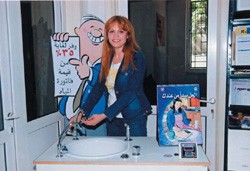
Although Jordan’s domestic water use rate of just under 21 gallons per person per day is among the lowest in the world, water resources are scarce in the region, making it a constant challenge for the government to supply this basic necessity to its people. The amount of water delivered to homes barely meets families’ needs for household chores such as cooking, cleaning and hygiene. Yet annual water consumption still exceeds renewable supplies, and groundwater tables are being overtapped at an alarming rate.
Water conservation has become an important element of efforts to address this challenge and improve water resource management. As part of its effort to increase public knowledge of water issues, USAID is create a cadre of professionals that understand the concepts of water conservation. Women, especially, are urged to participate as they uniquely effective in encouraging water conservation in the home. Khawla Al Sheikh is one of 23 women who recently participated in a plumbing course that will enable her to earn income repairing residential plumbing systems. Khawla was also among 110 women trained as agents for simple, cheap, easily installed water-saving devices, which they market to friends, family, neighbors and anyone else they can reach.
Working with Jordan’s Ministry of Water and Irrigation, USAID is also breaking stereotypes about women. Through the Jordan Forum for Business and Professional Women, women were trained to inform each other on water scarcity issues and how to conduct simple home water audits, reduce their bills and conserve water.
The program developed simple charts describing Jordan’s water sector, technologies that reduce water use without affecting lifestyles, and a simple method for calculating home use and the water and money savings that might come from installing a low-flow showerhead a new toilet cistern. Khawla and six others went on to participate in a plumbing licensing course at the Vocational Training Center—where they became the first women plumbers in Jordan.
USAID’s outreach has been an immense success and an unparalleled change agent for women. Over two years, the program reached 50,000 women who sold more than 4,000 water-saving devices. Their average income ranges from $7.50 a month to more than $300 and the success of the has prompted the Vocational Training Center to establish a formal women’s plumbing course.
Since her graduation, Khawla is aggressively pursuing her career as a plumber. She is conducting a market survey to help her establish service charges and is working with plumbing suppliers to market her services. She even appeared on Jordanian television. What’s next? More experience. Khawla has enrolled in the Vocational Training Center’s advanced plumbing course.







Comment
Make a general inquiry or suggest an improvement.